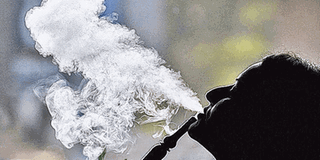No ban yet on ‘shisha’ smoking, says govt

Shisha smoking has gained rapid popularity in Tanzania in recent months despite the health risks associated with the habit.
PHOTO | FILE
What you need to know:
“The problem is not shisha. Not a single person frequenting my outlet has ever been killed by it, but count the ones who have succumbed to alcohol and bhang.”
Dar es Salaam. The government said yesterday that it had not banned the smoking of shisha, a fruit-scented tobacco often smoked through an ornate water pipe as a social activity.
The BBC said on Twitter that the government had banned the smoking of the substance following reports that smokers were mixing it with alcohol and bhang.
But the Chief Medical Officer, Dr Donald Mbando, told The Citizen that the BBC report was “unofficial”.
He said the public would be informed once such a decision was made.
“I can’t say whether there is a plan or not, but we will let the public know when an official decision is made,” he said. Shisha smoking has lately developed into a craze, with an increasing number of social joints offering the service to clients, but the fad has attracted criticism from anti-smoking and drug abuse campaigners and recently featured in Parliament, with some MPs calling for it to be banned.
However, such a move is unlikely to go down well with businesses offering shisha to their customers.
Mr Muntazir Hussein, owner of Sheesha Garden Café in Oysterbay, Dar es Salaam, told The Citizen that the government should do its homework before deciding to ban the smoking of shisha, adding that it is a legal substance that is fit for human use.
“Shisha is used worldwide. If it was harmful, then it would have been banned long ago,” he said.
Mr Hussein refuted claims that smokers were now using alcohol and bhang while smoking the substance, adding that if that was the case, then the government should ban alcohol and bhang first.
“The problem is not shisha. Not a single person frequenting my outlet has ever been killed by it, but count the ones who have succumbed to alcohol and bhang.”
According to the World Health Organisation (WHO), one hour of smoking shisha is equivalent to inhaling up to 200 times the volume of smoke in one cigarette.
WHO also says second hand shisha smoke can pose serious health risks and sharing the mouthpiece can spread diseases such as tuberculosis.
Smoking shisha through bubbling water does not filter out dangerous toxins and smoking it during pregnancy can harm the unborn baby, WHO adds. Mr Hussein, who also supplies shisha to a number of top hotels in Dar es Salaam, confirmed that business was booming and a blanket ban on the substance would come as a blow to his business. He said he was paying about Sh2 million every month as value added tax.
“We will definitely lose out, but the government too stands to lose a lot,” Mr Hussein said. The use of shisha has in recent months been spreading rapidly in Dar es Salaam and other major urban centres.
Areas in Dar es Salaam where shisha smoking has gained popularity include Kinondoni, Oysterbay, Masaki, Upanga and Mikocheni.
Two or more people may share the same pipe. In some cultures, children may smoke it with their parents.
A survey by The Citizen recently established that a portion of the substance is sold for between Sh10,000 and Sh15,000, depending on the location. The water pipes generally consist of a head, body, water bowl and hose. Tobacco, which may be flavoured with fruits and sugar syrup, is placed in the head and often covered with perforated aluminium foil. Burning charcoal is placed on top of the foil.
Water is placed at the bowl, submerging a tube through which the smoke escapes. Sucking on the hose causes a vacuum in the air space above the water, causing the smoke to pass through the water producing bubbles.
Health experts are now sounding the alarm over the excessive consumption of the substance, saying shisha smoking can be as harmful as smoking cigarettes.




